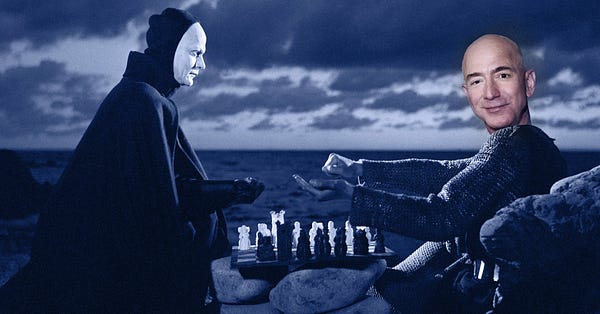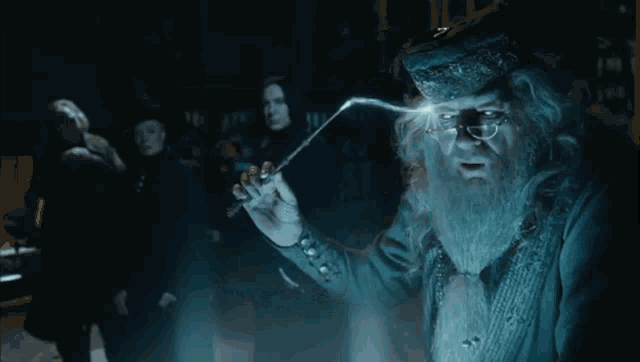Bezos funded longevity startup, Altos Labs — more than just clickbait (hopefully)
Beyond the fever-level hype and clickbait circulating, what exactly will Altos Labs be working on?
Hi friends 👋
Welcome to Health & Wealth — your weekly source of the latest health research and biotech trends. If you are new, you can join here and tell your friends. Hit the heart button if you like this post and reply with any feedback.
Next week I'll be bringing it back closer to the present day with a deep dive on the emerging market of needle-free continuous glucose monitors (CGMs) — stay tuned! ✨
Article Highlights
Altos Labs is the latest well-funded venture working on reprogramming cells to a more youthful state. They've recruited a roster of all-star scientists and already raised $270 million.
Their CEO, Dr. Rich Klausner (co-founder of GRAIL), hinted at Altos and his involvement in an interview released in June 2021. There, he talked about induced reprogramming via Yamanaka factors and natural rejuvenation that happens during embryo formation.
Altos will likely try to rejuvenate adult cells through both means — 1) fine-tuning artificial induction and 2) understanding/mimicking the natural process of embryonic rejuvenation.
Measuring and reversing aging will work in tandem. Epigenetic clocks, a way to estimate biological age, will help confirm whether cellular reprogramming worked or not.
Earlier this month, the longevity community went nuts following this MIT Technology Review article:


For those who haven't been following, let me catch you up to speed.
The article describes a startup rumored to have already raised $270 million thanks to tech billionaires including Jeff Bezos and Yuri Milner, a growing roster of all-star scientists offered sports-star salaries of $1 million a year or more + equity, and a lofty, somewhat ambiguous goal to pursue “biological reprogramming technology.”
The announcement sparked a lot of interest and also stirred up some controversy and debate:


I don't want to waste your time rehashing what's already been said. Media syndicates are already doing a great job with that, and frankly, a bit too good of a job.
What I am curious about is understanding what Altos Labs is actually trying to do and whether this is more than just a bunch of billionaires throwing money at a problem until it goes away.
To do that, we need to work backward and put together the pieces:
Altos Labs CEO's comments on reprogramming
How embryos reset cells to "ground zero" of aging
Is it possible to mimic similar rejuvenation in adult cells?
Measuring reprogramming success through epigenetic clocks
Initial closing thoughts
To cheesily quote Professor Dumbledore:
“From this point forth, we shall be leaving the firm foundation of fact and journeying together through the murky marshes of memory into thickets of wildest guesswork.”
Let’s get to it.
Altos Labs CEO Rick Klausner's comments on reprogramming
Altos Lab's CEO, Dr. Richard Klausner, is not another fantasy-driven, false prophet of science like Elizabeth Holmes.
Klausner is the Godfather of life sciences. He was a former director of the National Cancer Institute and co-founded companies like Juno Therapeutics (cancer immunotherapy) and GRAIL (multi-cancer early detection blood test).
But I mention him in particular because while he didn't make any comments for the MIT article, he did speak about his interest in aging earlier this year in an interview with Joe Lonsdale. When asked what he's excited about working on next:
"I'm getting interested in what I think is the biggest mystery of life and biology, which is why we age. There's been an explosion, early and quiet, of research building up over the past 20 years that actually tells us that hidden within every cell is the ability to turn back the clock...
The goal in medicine is for everyone to die young — after a long time. I think this is going to be the hottest area of science in the history of biological science." [American Optimist: Rick Klausner]
How does he foresee this grand vision working out?
Without explicitly spelling out "Altos Labs," Klausner lays out how he thinks about aging:
"There always had to be a back door of rejuvenation, or else our species would have a shorter and shorter lifespan. So after fertilization, the clock is reset. Cells can do that, and the ability to understand and control that would be the biggest revolution in medicine, health, maybe even society that humanity has ever experienced."
(If you're wondering what exactly this means, I talk about this more in the next section.)
He then discusses the Yamanaka transcription factors that can turn cells into pluripotent stem cells (iPSCs). iPSCs have the ability to become any cell in the body, essentially rewinding the clock.
A key challenge in reprogramming cells, though, is that cells can also lose their cell identity. A skin cell "forgets" that it was once a skin cell. This is not useful for adults — we wouldn't want to become an undifferentiated blob of potentially cancerous stem cells. However, Klausner goes on to say:
"Over the last few years, a number of scientists have figured out how to manipulate the Yamanaka factors to dissociate the resetting of the age clock from the loss of cell identity."
If you have the time, I recommend you watch the interview — around the end of minute 16 is when he started to hint about Altos Labs:
The bottom line: A lot of the media attention has been focused on the people funding Altos. But what's equally, if not more important, are the people actually running the ship. So far, Altos seems to be off to a good start on that front.
Embryo formation resets cells to "ground zero" of aging
The "back door of rejuvenation" that Klausner was referencing is what was found in this article published in June 2021.
A team from Harvard showed that the age of mouse embryo cells resets about a week into development. This means the "ground zero" of aging is during the early stages of embryonic development — allowing the offspring's cells to start with a clean slate.
How did they pinpoint the exact timing of this rejuvenation event?
They were able to know when rejuvenation happens by measuring the biological age of these mouse embryos through epigenetic clocks. I wrote a primer on epigenetic clocks if you're curious to learn more about this concept.
Here is what's fascinating: the average epigenetic age of day 7 embryos was consistently lower than embryos at earlier stages of development.
Not to scale, but the general trend looks something like this:
This suggests human cells also undergo a similar rejuvenation event during embryogenesis.
Do we know exactly how this happens? Uh... no, that remains a mystery. And that's a key question Altos Labs hopes to answer.
Is it possible to mimic similar rejuvenation in adult cells?
The real question is: are we able to do something similar in adult cells to make people younger on a cellular level?
The Yamanaka factors induce artificial cellular reprogramming. We don't know yet how close this process is to what already happens naturally in embryos.
Altos will likely come at trying to rejuvenate adult cells from both angles:
Apply Yamanaka factors to human cells while minimizing the risk of tumor growth and loss of cell identity.
Figure out the mechanism of embryonic rejuvenation and how this can improve upon and/or replace the use of Yamanaka factors.
Measuring reprogramming success through epigenetic clocks
"If you can't measure it, you can't improve it."
— William Thomson, inventor of the absolute temperature scale
In addition to trying to cause rejuvenation, Altos will also be improving the way we measure rejuvenation. This is critical because rapid clinical studies need tight feedback loops. It would take too long to wait until time to death. So epigenetic clocks are proxy endpoints to know whether an anti-aging intervention actually works.
The person at Altos to lead the charge on improving how we measure aging is none other than Dr. Steve Horvath, the King of Clocks. As the developer of the first epigenetic clock, Horvath recognizes the important role companies will play in shaping our future. In a recent talk, he remarked:
"I believe that companies that use effective biomarkers of aging will succeed at developing effective anti-aging interventions. Success will ultimately lead to emulation and adoption."
Measuring and reversing aging will likely work in tandem — Altos will use epigenetic clocks to help confirm whether cellular reprogramming worked or not.
Initial closing thoughts
I'm optimistic that Altos will become a promising venture towards extending healthy life and that it won't end up as the next Halcyon Molecular. The rate of progress and breakthrough products are what's unknown — this is a hairy, audacious problem that will be a marathon to bring anything into fruition. If efforts are successful, Altos has the potential to bring a breakthrough impact on human health and society.
Based on what I've gathered, I believe Altos will be working on the following:
Reprogram cells to become stem cells again by applying Yamanaka factors (or a subset of the 4) to cells. Fine-tune the process to minimize the risk of tumor growth and loss of cell identity.
Understand the mechanism of embryonic rejuvenation and compare this natural process with artificial induction via Yamanaka factors.
Mimic embryonic rejuvenation in adult cells to improve upon and/or replace the use of Yamanaka factors.
Develop robust epigenetic clocks to measure reprogramming success to evaluate the effectiveness of their future therapies.
I look forward to learning how closely my thoughts match their future announcements!
Your feedback helps me make this great. What am I wrong about or what might have I missed?
If you enjoyed this post, subscribe and tell your friends!
Thanks for reading!
Christina








